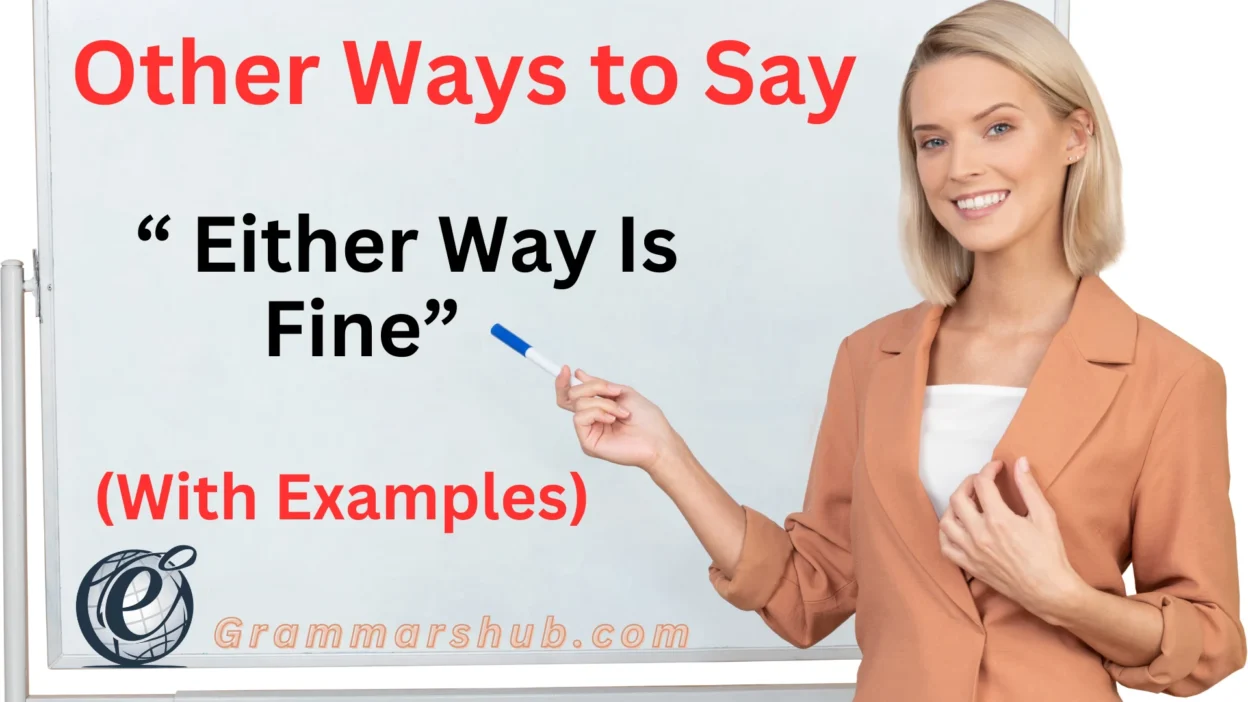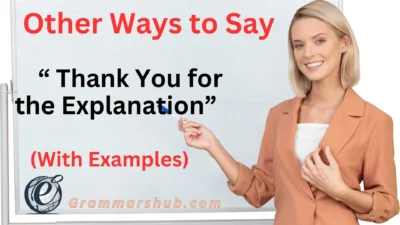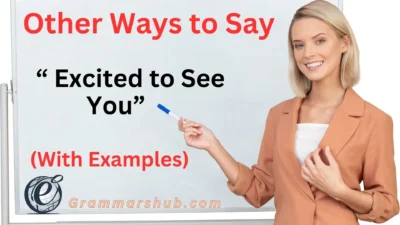When we express flexibility and openness in conversations, it’s important to choose words that convey that same sense of ease and understanding. Replacing the phrase “either way is fine” with more thoughtful alternatives can add nuance, warmth, and clarity to your message.
This guide will explore 30 other ways to say “either way is fine”, offering you plenty of options to choose from in various contexts.
What Does “Either Way Is Fine” Mean?
“Either way is fine” expresses an openness to different options or outcomes, indicating that the speaker has no strong preference between two choices. It can also convey a relaxed or accommodating attitude, letting the listener know they are free to choose without concern for the outcome.
Is It Professional/Polite to Say “Either Way Is Fine”?
Yes, “either way is fine” is professional and polite in most situations. However, in more formal settings, using a more specific or refined phrase might sound more considerate and thoughtful. By choosing one of the alternatives below, you can communicate with the same flexibility while sounding more engaging and empathetic.
Advantages and Disadvantages of Using “Either Way Is Fine”
Advantages
- Flexibility: It communicates an open-minded, accommodating attitude.
- Simplicity: Easy to use and understand in most casual or professional exchanges.
- Neutrality: Indicates no strong preference, which can reduce pressure.
Disadvantages
- Vague: Can sound indifferent or noncommittal in some situations.
- Overused: Repeated use may come off as too passive or unhelpful.
- Lack of Detail: Doesn’t necessarily contribute to meaningful conversation or decision-making.
Either Way Is Fine Of Synonyms:
- It doesn’t matter
- I’m good with either option
- Whatever works for you
- I’m happy either way
- It’s up to you
- No preference
- I’m flexible
- I’m fine with whatever
- Both work for me
- I’m okay with either choice
- Whatever you decide
- I have no strong preference
- I’m open to both
- It’s all the same to me
- I don’t mind either way
- Do what you think is best
- I’m easygoing
- Whichever you prefer
- Either option works for me
- No problem either way
- It’s your call
- I trust your judgment
- Whatever’s easiest for you
- I’m fine with whatever you decide
- Either one is fine with me
- I’m happy with either choice
- It’s whatever you’re most comfortable with
- No issues either way
- I’m not particular
- Whatever suits you best
1. It Doesn’t Matter
Meaning: Indicates no preference or concern for the outcome.
Definition: A way to express indifference between two options.
Detailed Explanation: This phrase conveys complete neutrality, implying that the outcome holds no weight for the speaker.
Scenario Example: “You can choose the restaurant; it doesn’t matter to me.”
Best Use: Casual conversations when the decision is not important.
Tone: Casual, neutral.
2. I’m Good with Either Option
Meaning: Comfortable and content with either choice presented.
Definition: Expresses satisfaction and acceptance for both options.
Detailed Explanation: Implies that the speaker is happy with any option and isn’t particular about the choice.
Scenario Example: “I’m good with either option, just let me know what works for you.”
Best Use: Casual or professional situations when flexibility is needed.
Tone: Friendly, accommodating.
3. Whatever Works for You
Meaning: Allows the other person to make the decision.
Definition: Suggests that the speaker is open to whatever option the other person prefers.
Detailed Explanation: Shows a high level of respect for the other person’s preferences and prioritizes their comfort.
Scenario Example: “I’m happy to go along with whatever works for you.”
Best Use: Personal or collaborative settings, such as team discussions.
Tone: Respectful, accommodating.
4. I’m Happy Either Way
Meaning: Expresses contentment with either choice.
Definition: Indicates satisfaction with both options, showing a lack of preference.
Detailed Explanation: A friendly and positive way to show that you’re easygoing about the decision.
Scenario Example: “I’m happy either way, as long as we make a decision.”
Best Use: Casual or informal conversations.
Tone: Positive, relaxed.
5. It’s Up to You
Meaning: Let the other person decide without interference.
Definition: A way of expressing that the speaker doesn’t mind which option is chosen.
Detailed Explanation: A highly flexible and accommodating phrase that places the decision-making in the other person’s hands.
Scenario Example: “It’s up to you where we go for lunch today.”
Best Use: Professional or casual settings, when the speaker wants to defer to someone else.
Tone: Respectful, neutral.
6. No Preference
Meaning: Indicates that the speaker has no strong feelings about either option.
Definition: A straightforward and clear way to express indifference.
Detailed Explanation: Commonly used in situations where the speaker has no attachment to the decision being made.
Scenario Example: “I have no preference for the movie; you can pick.”
Best Use: Casual settings or when offering a decision to someone else.
Tone: Neutral, relaxed.
7. I’m Flexible
Meaning: Indicates openness to any choice or option.
Definition: Shows willingness to adapt and accept different possibilities.
Detailed Explanation: This phrase suggests that the speaker is open to adjusting plans based on what others prefer.
Scenario Example: “I’m flexible with the timing, whatever suits you best.”
Best Use: Professional, casual, or collaborative contexts.
Tone: Adaptable, approachable.
8. I’m Fine With Whatever
Meaning: Expresses no preference for any option.
Definition: Indicates that any choice is acceptable to the speaker.
Detailed Explanation: A casual phrase that’s perfect for situations where no decision is crucial or when it’s irrelevant to the speaker.
Scenario Example: “I’m fine with whatever you decide for the meeting agenda.”
Best Use: Casual conversations or low-stakes decisions.
Tone: Easygoing, nonchalant.
9. Both Work for Me
Meaning: Accepting both choices without issue.
Definition: Shows that the speaker is okay with any of the two options.
Detailed Explanation: Often used when both options are equal or acceptable, indicating complete flexibility.
Scenario Example: “Both work for me; I’m happy with either option.”
Best Use: Casual or semi-professional settings.
Tone: Neutral, accommodating.
10. I’m Okay With Either Choice
Meaning: Comfortable with both choices presented.
Definition: A clear expression of satisfaction with both options.
Detailed Explanation: Indicates that the speaker is happy with either option and is indifferent about the decision.
Scenario Example: “I’m okay with either choice, so feel free to decide.”
Best Use: Situations where the decision is minor or unimportant.
Tone: Friendly, relaxed.
11. Whatever You Decide
Meaning: Leaving the decision entirely to the other person.
Definition: Indicates that the speaker has no preference and is content with whatever choice the other person makes.
Detailed Explanation: A phrase that shows complete trust in the other person’s judgment.
Scenario Example: “You choose, whatever you decide works for me.”
Best Use: When you want to convey trust and flexibility in personal or professional settings.
Tone: Trusting, accommodating.
12. I Have No Strong Preference
Meaning: Indicating neutrality and openness.
Definition: A way to express indifference, with no strong feelings about any particular choice.
Detailed Explanation: This phrase is often used when you want to show that you’re completely flexible and there are no stakes in the decision.
Scenario Example: “I have no strong preference about the project timeline; whatever suits you is fine.”
Best Use: Professional settings or when discussing logistics and planning.
Tone: Neutral, formal.
13. I’m Open to Both
Meaning: Willing to accept both options.
Definition: Shows that the speaker is receptive to either choice.
Detailed Explanation: This phrase suggests openness and flexibility in the decision-making process.
Scenario Example: “I’m open to both ideas; whichever direction you prefer is fine by me.”
Best Use: In discussions or brainstorming sessions where ideas are being weighed.
Tone: Open-minded, flexible.
14. It’s All the Same to Me
Meaning: No difference between the two options.
Definition: Expresses indifference to the choices and shows no particular preference.
Detailed Explanation: A very casual way of saying that the options are equal in importance.
Scenario Example: “It’s all the same to me, whichever option is easier for you.”
Best Use: Casual conversations or when the decision is not significant.
Tone: Casual, indifferent.
15. I Don’t Mind Either Way
Meaning: Neutral toward both choices.
Definition: Expresses that the speaker is comfortable with whatever choice is made.
Detailed Explanation: This phrase emphasizes that the speaker has no strong feelings toward either option.
Scenario Example: “I don’t mind either way, whatever you think is best works for me.”
Best Use: Casual or relaxed situations.
Tone: Relaxed, approachable.
16. Do What You Think Is Best
Meaning: Leaving the decision to someone else, trusting their judgment.
Definition: Suggests that the speaker trusts the other person to make the best decision.
Detailed Explanation: This phrase conveys trust and relinquishes control to the other person.
Scenario Example: “Do what you think is best regarding the timing of the event.”
Best Use: Situations where someone is seeking advice or input, but you trust their decision-making abilities.
Tone: Trusting, respectful.
17. I’m Easygoing
Meaning: Indicating flexibility and adaptability.
Definition: Expresses that the speaker is relaxed and open to any decision.
Detailed Explanation: A friendly, relaxed way of showing that you don’t mind what happens next.
Scenario Example: “I’m easygoing, so whatever works best for you is fine.”
Best Use: Informal situations where no strong opinions are involved.
Tone: Casual, friendly.
18. Whichever You Prefer
Meaning: Leaving the choice entirely to the other person’s preference.
Definition: This phrase shows full deference to the other person’s taste or decision.
Detailed Explanation: It shows that the speaker respects the other person’s opinion and is happy with whatever choice they make.
Scenario Example: “Whichever you prefer for the schedule, I’m happy with either option.”
Best Use: Professional or collaborative settings when you want to make the other person feel comfortable in making a decision.
Tone: Respectful, accommodating.
19. Either Option Works for Me
Meaning: Both choices are acceptable to the speaker.
Definition: Expresses complete openness to either choice.
Detailed Explanation: A flexible phrase indicating that no particular option is better than the other.
Scenario Example: “Either option works for me; I’m happy to go along with what you think is best.”
Best Use: Casual discussions or situations requiring quick decisions.
Tone: Neutral, easygoing.
20. No Problem Either Way
Meaning: No issues with any choice.
Definition: A relaxed and informal way to express that there are no difficulties with either choice.
Detailed Explanation: This phrase reassures the other person that the decision is low-pressure for the speaker.
Scenario Example: “No problem either way, I’m fine with whatever you choose.”
Best Use: Casual conversations, especially in team settings.
Tone: Casual, accommodating.
21. It’s Your Call
Meaning: The decision is entirely up to the other person.
Definition: A way of showing that the speaker defers to the other person’s decision.
Detailed Explanation: This phrase implies trust in the other person’s judgment and puts the ball in their court.
Scenario Example: “It’s your call; I’m happy with whatever you decide.”
Best Use: Situations where you want to empower someone else to make the decision.
Tone: Empowering, respectful.
22. I Trust Your Judgment
Meaning: Indicating that you believe in the other person’s ability to make the right decision.
Definition: A phrase that conveys confidence in someone’s decision-making process.
Detailed Explanation: This shows that the speaker fully supports and trusts the other person’s choice.
Scenario Example: “I trust your judgment, so choose whatever seems best to you.”
Best Use: Professional settings, where you want to show trust in someone’s expertise.
Tone: Respectful, supportive.
23. Whatever’s Easiest for You
Meaning: Letting the other person choose based on convenience.
Definition: Shows that you prioritize the other person’s comfort or ease in making a decision.
Detailed Explanation: Suggests that the decision should be based on what is most convenient or stress-free for the other person.
Scenario Example: “Whatever’s easiest for you, I’ll go along with it.”
Best Use: Casual or service-oriented settings.
Tone: Caring, considerate.
24. I’m Fine With Whatever You Decide
Meaning: Open to any choice the other person makes.
Definition: A phrase that shows the speaker has no preference and is comfortable with the other person’s decision.
Detailed Explanation: Expresses full flexibility and an easygoing attitude.
Scenario Example: “I’m fine with whatever you decide, just let me know what works for you.”
Best Use: Casual or professional discussions.
Tone: Relaxed, friendly.
25. Either One Is Fine with Me
Meaning: Both options are acceptable to the speaker.
Definition: A simple way to convey that either of the two options is good.
Detailed Explanation: This phrase is often used when the decision doesn’t matter much to the speaker.
Scenario Example: “Either one is fine with me, so feel free to decide.”
Best Use: Casual conversations.
Tone: Neutral, agreeable.
26. I’m Happy with Either Choice
Meaning: Expresses contentment with both options.
Definition: A phrase used to indicate that both choices are acceptable and the speaker has no preference.
Detailed Explanation: This phrase shows that the speaker is comfortable and satisfied with whatever choice is made.
Scenario Example: “I’m happy with either choice, so just let me know what you decide.”
Best Use: Casual or semi-formal situations where the speaker wants to express ease and openness.
Tone: Friendly, positive.
27. It’s Whatever You’re Most Comfortable With
Meaning: Indicates that the decision should be based on the other person’s comfort level.
Definition: Suggest the speaker values the other person’s ease and preferences over their own.
Detailed Explanation: A considerate and empathetic phrase that puts the other person’s comfort first in the decision-making process.
Scenario Example: “It’s whatever you’re most comfortable with. I’m happy with either option.”
Best Use: Personal and professional situations where empathy and understanding are important.
Tone: Empathetic, respectful.
28. No Issues Either Way
Meaning: No problem with any of the choices.
Definition: Indicates that either option is completely acceptable.
Detailed Explanation: A casual and reassuring phrase that conveys flexibility and ease in the decision.
Scenario Example: “No issues either way, I’m fine with whatever works for you.”
Best Use: Casual, informal settings where both choices are equal in importance.
Tone: Casual, easygoing.
29. I’m Not Particular
Meaning: Expressing that the speaker has no strong preference or specific demands.
Definition: A way of saying that the speaker is indifferent about the options and open to anything.
Detailed Explanation: This phrase highlights that the speaker is not choosy and is easy to accommodate.
Scenario Example: “I’m not particular, you can choose whatever works for you.”
Best Use: Casual, low-stakes conversations or decisions.
Tone: Relaxed, nonchalant.
30. Whatever Suits You Best
Meaning: Letting the other person make the decision based on their preferences or needs.
Definition: A polite and considerate phrase showing that the speaker wants the decision to be based on the other person’s comfort.
Detailed Explanation: It shows a willingness to prioritize the other person’s convenience and comfort in making the decision.
Scenario Example: “Whatever suits you best is fine with me. I’ll go along with it.”
Best Use: Personal or collaborative situations where you want to make the other person feel in control.
Tone: Polite, thoughtful.
Conclusion
Choosing the right words to express flexibility and understanding can make a significant difference in how our messages are received. Whether you’re trying to convey openness, trust, or simply a lack of preference, these 30 alternatives to saying “either way is fine” can add nuance and warmth to your communication.
Each phrase has its tone and context where it shines best, from professional settings to casual conversations. By choosing the right alternative, you can show empathy, respect, and ease while keeping the dialogue smooth and positive.




